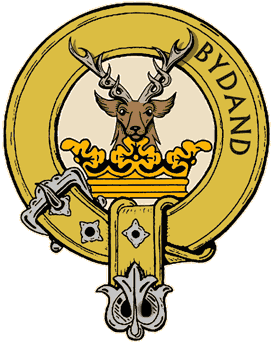Coileach an Taobh-Tuath
The Cock of the North
Tune
Simon Fraser's "Airs and Melodies of the Highlands" N°44 pg.16Sequenced by Christian Souchon
Lyrics unknown


|
THE COCK OF THE NORTH
"The 'Cock of the North' explains its original, being an honourably title of the Chiefs of Clan, Dukes of Gordon, by which that noble family deserve and delight to be known" During the Jacobite Uprisings of 1715 - 1716 and 1745 - 1746 there were Gordons on both sides. General Alexander Gordon of Auchintool, a former general in Peter the Great's army, followed the Jacobites in 1715 and was one of their best military leaders. He was the "Sandie (Gor)Don" of the song "Came ye frae France" and the "second-sighted Sandie" of the song "Up an' Waur'm all!" as well as of the 1745 rising song "A hundred Pipers". He was then too old for fighting himself but acted as counsellor to Prince Charlie. His "double sight" alludes to the fact that in both risings he foretold disaster, while remaining loyal to the Cause. The Marquess of Huntly, Alexander Gordon (1678-1728), known as "Cockolorum", mentioned in "Came Ye frae France" and "Auld Stuart's back again" was heir apparent to the first Duke of Gordon - and to the hereditary nickname of the Chief, "Cock of the North", was not so firm in his convictions. He followed the Jacobites in 1715 but fled after the Battle of Sherrifmuir and defected to the Hanoverians,
Cosmo Gordon, 3rd Duke of Gordon (1720 - 1752) supported the British government by the time of the 1745 uprising, while his brother, Lord Lewis Gordon (1726 - 1751) raised two regiments who fought against him at the Battle of Inverurie (1745), the Battle of Falkirk (1746) and the Battle of Culloden (1746). Alexander Gordon, 4th Duke (1743 - 1827) and his celebrated beautiful Duchess, Jean Maxwell, raised the 1rst regiment of "Gordon Highlanders" in 1777. Their tartan is derived from the Black Watch pattern by introducing a yellow strip into it and is sometimes referred to as "military". He composed the best version of Cauld Kail in Aberdeen and his buttler, William Marshall, allegedly, the tune "Tullochgorum" .
The 1rst Duke of Gordon, George Gordon (1649 - 1716) was 4th Marquess of Huntly. Granville Charles Gomer Gordon, 13th Marquess of Huntly (born 1944) makes a single malt whisky liqueur styled "Cock O' the North". Partiality for the cock is something Scots have in common with the French, who chose him as their heraldic symbol, a fact that prompted the English dashing war hero, Group Captain Peter Townsend to a statement on the French TV, to the effect that it was a good choice considering this fowl's prominent qualities: noisiness, inefficiency (he doesn't lay eggs) and conceit (he imagines he makes the sun rise...). This harshness must be a consequence of some private disappointments. |
LE COQ DU NORD "Le 'Coq du Nord' décrit celui à qui le terme se rapportait à l'origine et est maintenant un titre honorifique porté par les Chefs de clan et ducs de Gordon, titre par lequel cette noble famille mérite et est ravie d'être désignée." Capitaine Simon Fraser Pendant les soulèvements Jacobites de 1715 et 1745 il y eut des Gordon dans les deux camps. Le Général Alexandre Gordon d'Auchintool, ancien général de Pierre le Grand, combattit avec les Jacobites en 1715 et fut l'un de leurs meilleurs chefs. C'est le "Sandie Don" du chant "Si tu viens de France" et le "Sandie à la double-vue" du chant "Vas donner l'alerte!", ainsi que du chant "A hundred Pipers" qui a trait à 1745. Dans le 2ème cas, il était trop âgé pour combattre mais fit office de conseiller du Prince Charles. Sa "double vue" est une allusion au fait qu' au cours des deux soulèvements il prédisait un désastre, tout en restant loyal à la cause. Le Marquis de Huntly, Alexandre Gordon (1678 - 1728), connu sous le nom de "Cockolorum" mentionné dans "Si tu viens de France" et "Les Stuart sont de retour", était l'héritier apparent du premier Duc de Gordon et du surnom héréditaire du Chef "Coq du Nord". Il ne se montra pas aussi ferme dans ses convictions. Il se rangea du côté des Jacobites en 1715. mais il s'enfuit après la bataille de Sherrifmuir et passa dans le camp des Hanovriens.
De ses deux fils, l'un, Côme Gordon (1720-1752), 3ème duc, soutint le gouvernement anglais lors des événements de 1745, tandis que le second, Lord Louis Gordon (1726 - 1751), levait contre lui deux régiments qui le combattirent à la bataille d'Inverurie (1745), à celle de Falkirk, ainsi qu'à Culloden (1746). Alexandre, 4ème duc (1743 - 1827) et sa belle et célèbre épouse, Jeanne Maxwell, constituèrent le Premier régiments de "Gordon Highlanders" en 1777. Son tartan est celui de la Garde Noire dans lequel la bande noire centrale est remplacée par une jaune, donnant ce qu'on appellele tartan Gordon "militaire". C'est lui qui composa la meilleure version du chant Cauld Kail in Aberdeen et l'on attribue à son majordome, William Marshall la mélodie "Tullochgorum"
Le premier duc de Gordon, Georges Gordon, fut le 4ème Marquis de Huntly. Granville Charles Gomer Gordon, 13ème Marquis de Huntly (né en 1944) produit une liqueur de whisky pur malt de marque "Coq du Nord". Cette prédilection pour le coq rapproche les Ecossais des Français qui en ont fait leur animal emblématique. C'est ce qui conduisit un jour le héros anglais de la guerre, le Colonel Peter Townsend à déclarer à la télévision française que c'était là un bon choix compte tenu des principales caractéristiques dudit volatile: un braillard inefficace (qui ne pond pas d'oeufs) et imbu de soi-même au point d'imaginer qu'il fait lever le soleil... On peut voir dans cette acrimonie le résultat de déceptions d'ordre privé. |
